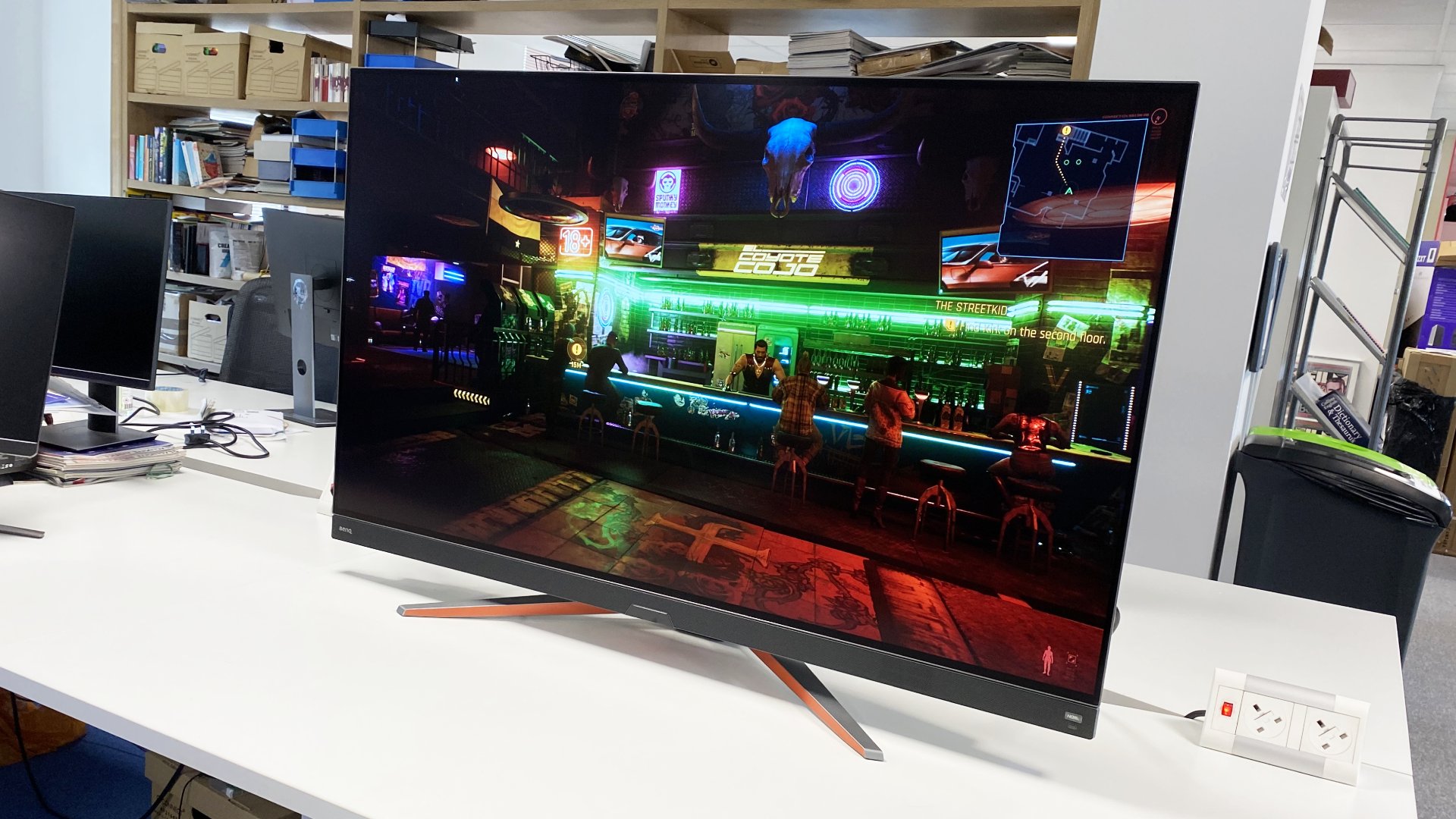GamesRadar+ Verdict
A 48-inch 4K OLED panel with proper PC connectivity, 120Hz refresh and 0.1ms response is a heck of a proposition. In practice, it lacks visual punch while the ergonomics of a "monitor" this big are dubious.
Pros
- +
Epic 4K OLED panel
- +
Ultra-fast response
- +
Perfect black levels
Cons
- -
Disappointing brightness
- -
Not really a PC monitor
- -
It's serious money
Why you can trust GamesRadar+
We've been waiting years for OLED tech to hit the PC market. Now there's a veritable avalanche of new OLED desktop monitors, the latest of which is the unambiguously mighty, undeniably epic BenQ Mobiuz EX480UZ. Just look at all 48 inches of it.
Actually, it's debatable if a screen this big truly qualifies as a PC monitor. But BenQ is certainly giving it a go thanks to features like DisplayPort and USB-C connectivity. Of course, it's the OLED tech that's the real attraction here, in this case with the full 4K pixel grid, 120Hz refresh, and 0.1ms response - the latter being far faster than any of the best gaming monitors that are LCD based, including the latest mini-LED models. It also gets a monitor-style stand, albeit limited to tilt adjustment.
This, then, is the PC monitor taken to the max. But is it actually any good? OLED technology certainly has its shortcomings in a PC context, and a place among the best 4K monitors for gaming is hard-won. More to the point, at this lofty price, almost any weakness will be hard to forgive.
| Key Specs | Header Cell - Column 1 |
|---|---|
| Screen Size | 48-inch |
| Resolution | 3,840 x 2,160 |
| Panel Type | LG OLED |
| Brightness | 450 nits peak, 135 nits full screen |
| Response Time | 0.1ms |
| Refresh Rate | 120Hz |
| Features | G-Sync compatible, 98% DCI-P3, DisplayPort 1.4, HDMI 2.1 x2, USB-C with 90W PD, USB-A hub |
Design and features
In terms of aesthetics, the BenQ Mobiuz EX480UZ is right out of the standard Mobiuz gaming monitor design playbook. There's the usual mix of black and silver plastics punctuated with orange accents. Likewise, as with other Mobiuz models, the monstrous EX480UZ mimics its smaller cousins with slim bezels on three sides of the display, a fairly fat chin, and a couple of RGB lighting strips on the rear.
Overall, the build quality is good and the vibe is suitably "gamery" without being overly adolescent. But it is very big, to the point where ergonomics become an issue. Using this display as a desktop monitor is a dubious proposition - it just takes up so much space. But if what you want is essentially one of the best gaming TVs, well, why pay the premium for the PC-centric features?
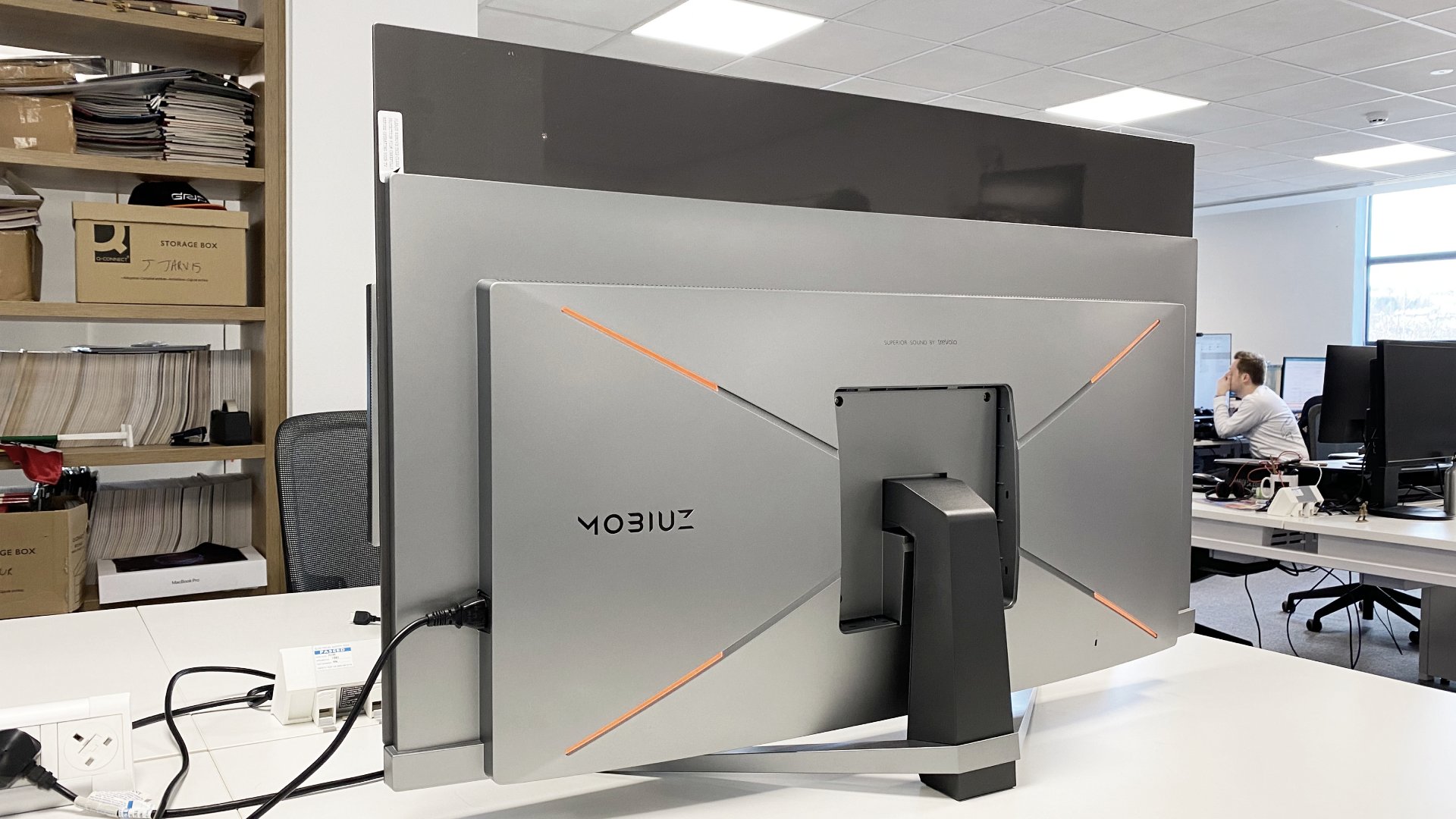
Speaking of which, those mainly comprise a DisplayPort 1.4 socket plus a USB-C port with 90W of power delivery, neither of which you are ever likely to see on an OLED TV. The USB-C port, of course, allows you to connect a laptop with a single cable and both drive the display and charge the laptop itself.
The EX480UZ also has a pair of HDMI 2.1 ports which support the full 4K resolution at 120Hz. In that regard, this monitor is perfect if you need a big display to share between one of the best gaming PCs and one of the latest 4K 120Hz-capable consoles from Sony or Microsoft.
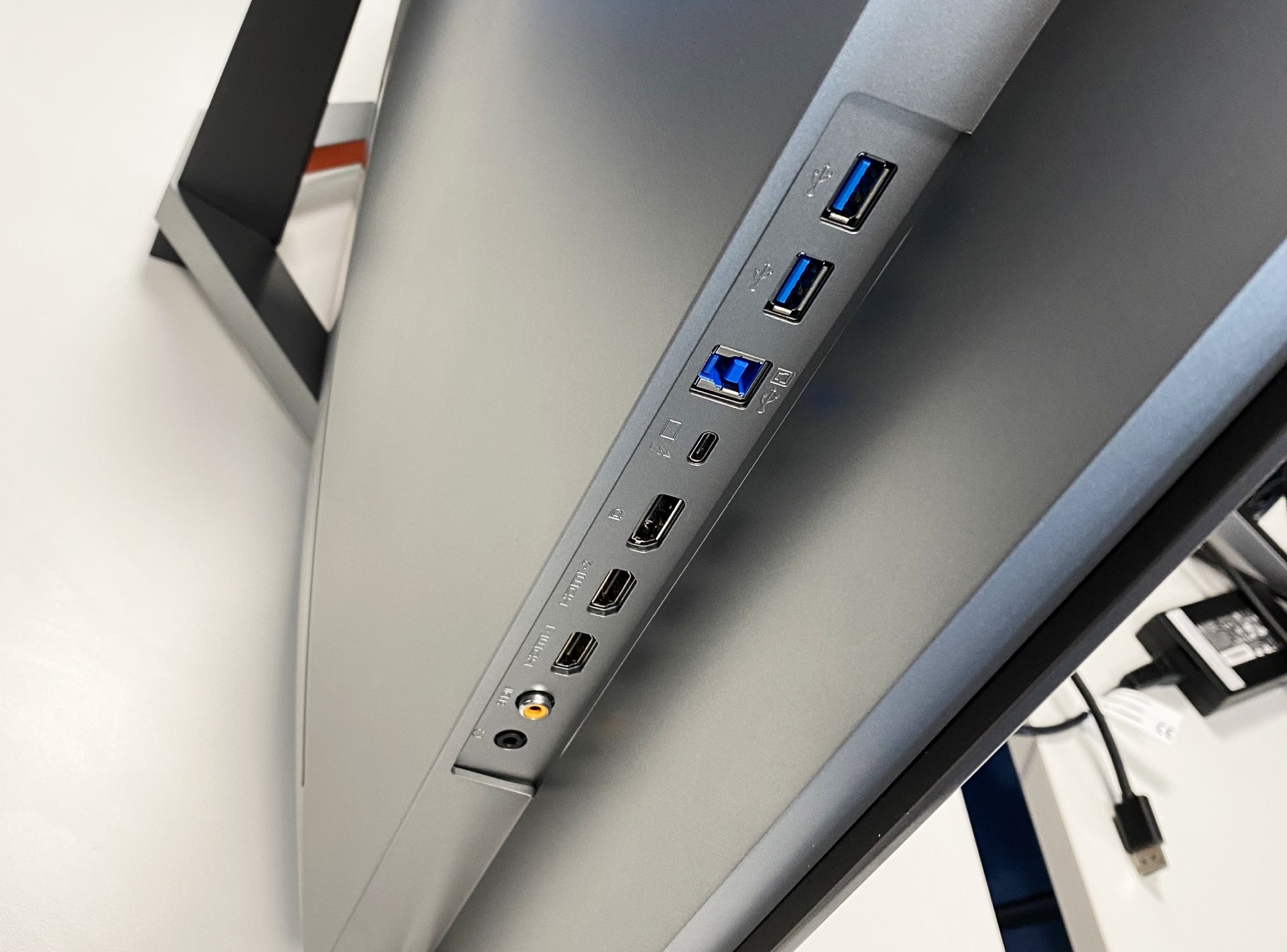
Factor in support for both AMD FreeSync and Nvidia G-Sync flavours of adaptive refresh and you have a strong overall gaming feature set. With 98% coverage of the DCI-P3 digital cinema gamut, it promises good video playback and accurate performance in Windows, too. For the record, you also get BenQ's Trevolo audio setup with a 2.1 speaker system including a 10W subwoofer, plus an IR remote for the OSD settings.
Performance
Brightness is one of the main worries with any OLED monitor in a PC gaming context and the BenQ Mobiuz EX480UZ's peak brightness of 450 nits doesn't look like a great start, nor does the full-screen brightness of 135 nits.
In practice, the EX480UZ is a bit of a mixed bag. It all depends on the image being displayed. If it's mostly dark, then bright highlights have reasonable pop and punch. But let's say you have a bright desktop wallpaper or a mostly white browser window stretched across the screen, the panel's automatic brightness limiter or ABL kicks in and ramps the overall brightness right back.
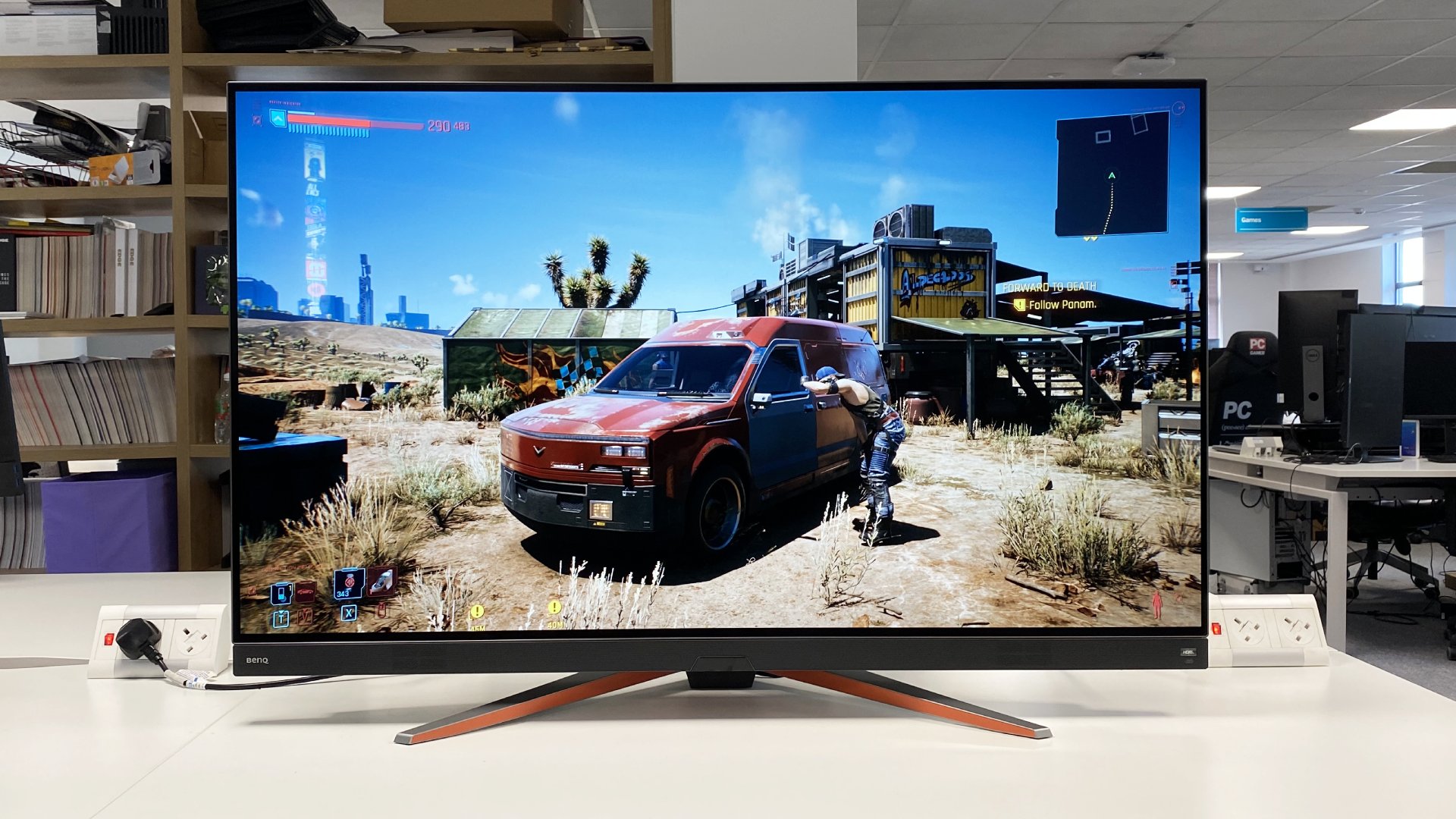
You can actually see that happening as you, for instance, resize a white browser window on a dark wallpaper background. The bigger you make the window, the dimmer the display gets. It's awfully clunky. Of course, it's not a problem unique to this BenQ monitor. It uses an LG-sourced OLED panel and they pretty much all exhibit this behaviour to some degree.
In game, the machinations of the ABL are much less obvious. But the problem of full-screen brightness remains and again varies depending on what's being displayed. An outdoor scene in, say, Cyberpunk 2077 running in what ought to be all its HDR glory looks, well, just a bit dull.
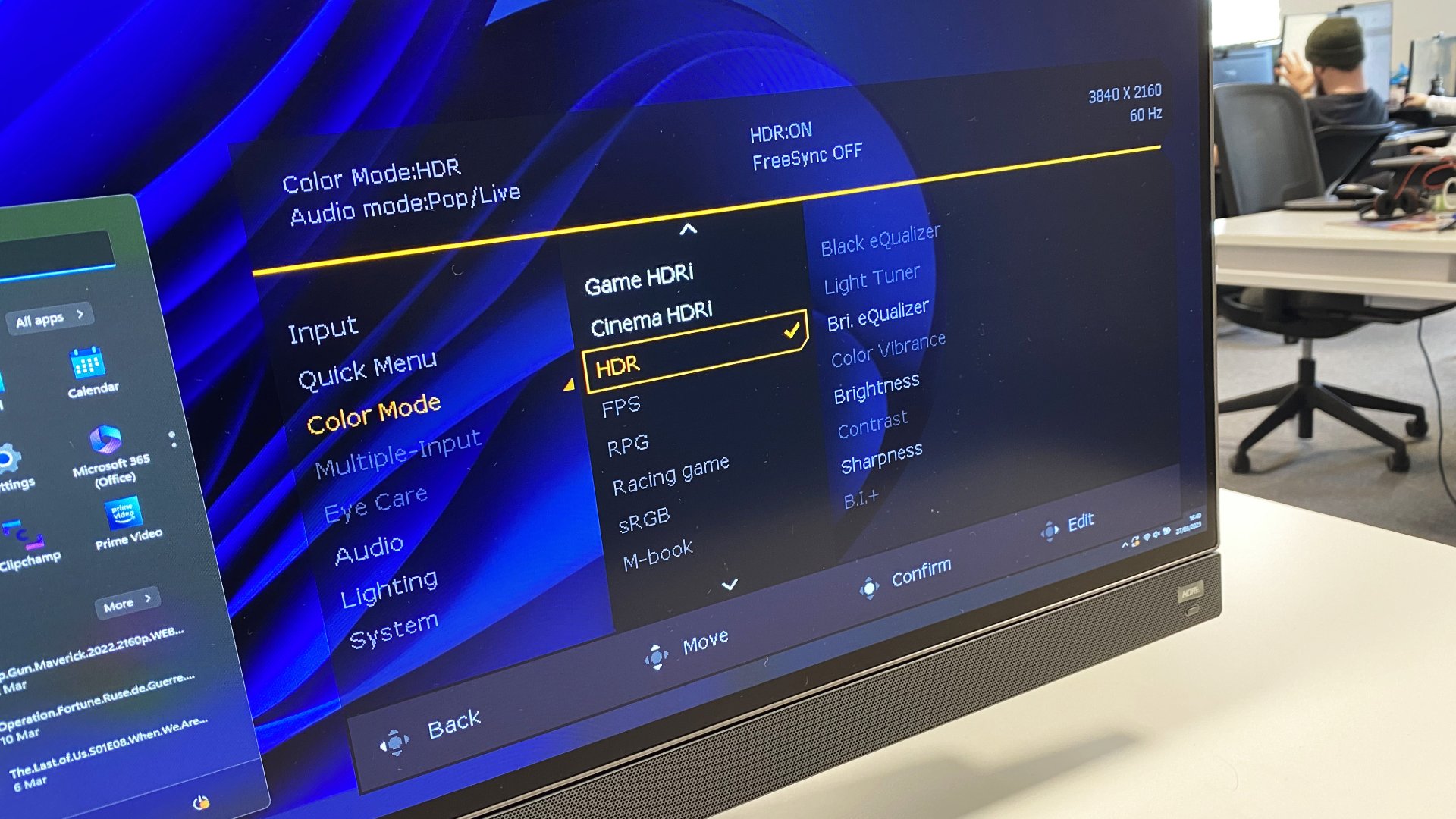
Step inside, on the other hand, and the neon lights in the underground bar zing quite nicely against the deep, inky blacks. So, the HDR performance can be pretty convincing in some scenarios.
Even better is the pixel response, which absolutely rips. Combined with the 120Hz (which narrowly misses the 144Hz needed to qualify for our best high refresh rate monitor list), this is a very fast and responsive panel. The catch, of course, is that the 4K resolution is awfully demanding. You'll need one of the best graphics cards to make the most of that 120Hz refresh, that's for sure.
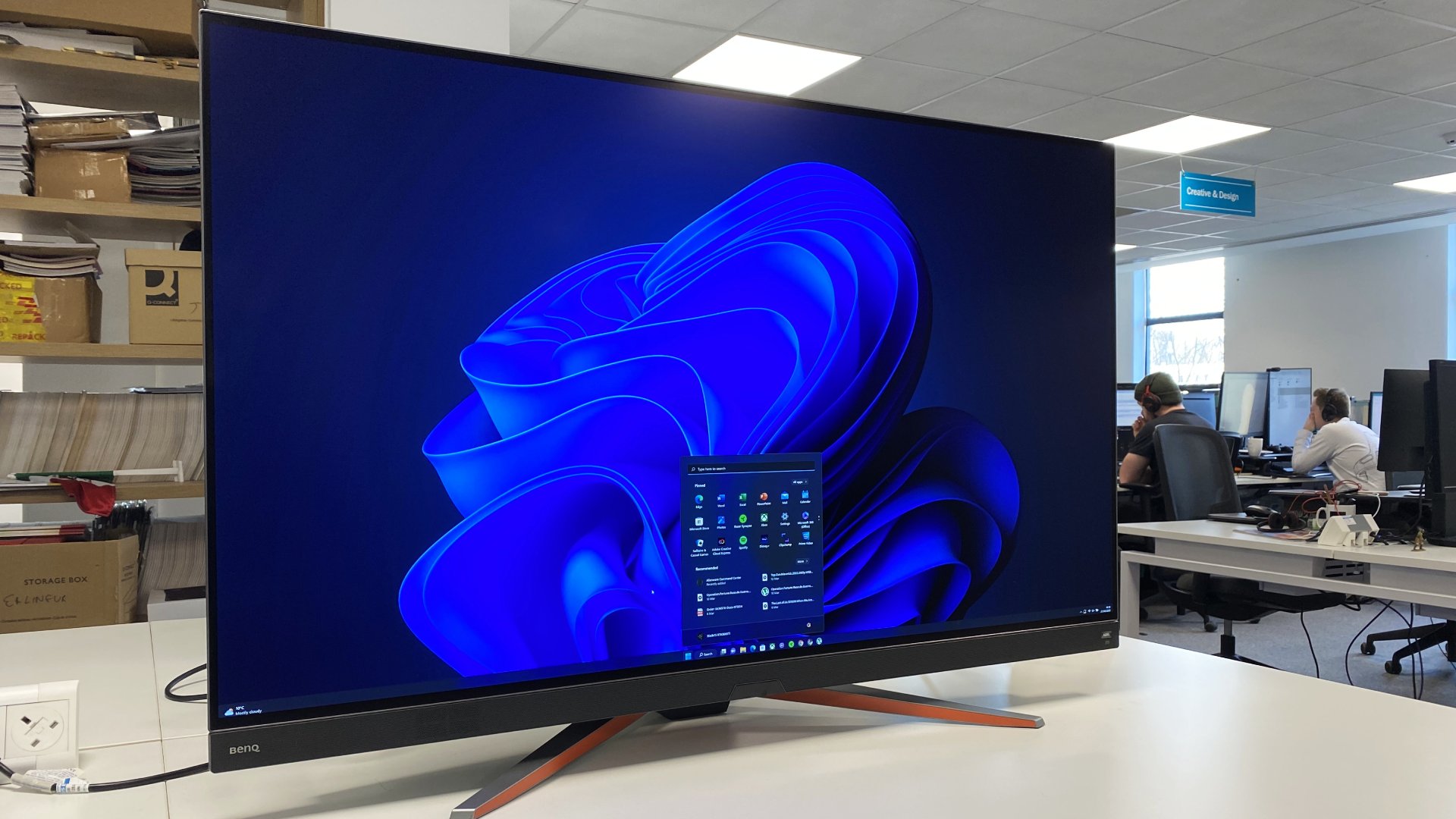
Should you buy the BenQ Mobiuz EX480UZ?
Like every PC monitor based on LG OLED technology thus far, the BenQ Mobiuz EX480UZ fundamentally lacks punch. As an all-round PC monitor, the full-screen brightness simply isn't good enough and the clunky ABL algorithm is likewise difficult to live with at this price point.
Purely for gaming, you can make a better argument for this monitor. The huge scale of the panel is stunning, and the pixel response and lack of motion blur are a revelation compared to conventional LCD monitors.
And yet it still lacks the zing and visual drama you have every right to expect for this kind of money. It's worth noting that monitors based on Samsung's competing QD-OLED panel tech, such as the Alienware AW3423DW, fare significantly better in the full-screen brightness stakes and thus far are proving better suited to the demands of the PC.
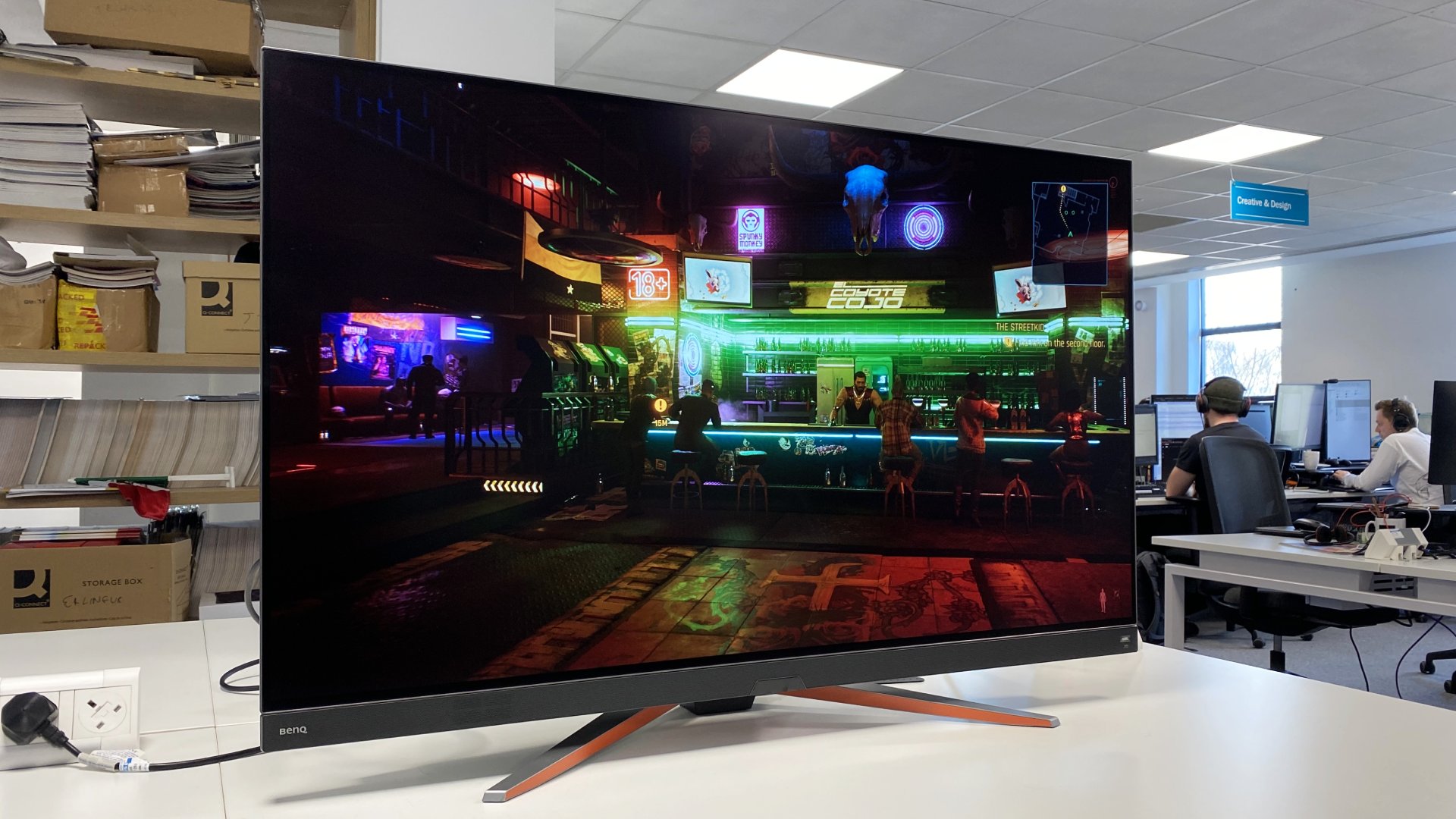
The possible downside is that there's some evidence that QD-OLED is more prone to burn in than LG's OLED technology. It's early days in that regard. These monitors simply haven't been on the market long enough to judge the extent to which burn-in or image retention will be an issue.
In the end, the BenQ Mobiuz EX480UZ finds itself operating in a rather narrow niche. The added connectivity is great, but there's quite a price to pay for it versus a comparable 48-inch OLED 4K TV. Meanwhile, smaller monitors based on Samsung QD-OLED tech make for better actual PC monitors in terms of both size and ergonomics on the one hand and brightness on the other.
If you must have a very large OLED monitor with proper PC connectivity, this ticks those boxes. But with that very specific remit come flaws that are tough to tolerate, especially given the megabucks price tag.
How we tested the BenQ Mobiuz EX480UZ
OLED screens bring their own particular foibles, which we test by assessing brightness across a range of scenarios, including test videos, games, movies, and Windows workloads. We log the impact of any ABL algorithms and then consider other aspects including pixel response, latency, and HDR performance, including how the display handles SDR content in HDR mode. We also consider further factors including ergonomics, connectivity, design, and value for money in arriving at an overall verdict.
To read more about how we test the latest gaming tech, you can peruse our hardware policy.
If this monitor isn't for you, take a look at the best G-Sync monitor, the best ultrawide monitor, and the best PS5 monitor.
A serious dissertation on the finer points of input lag and overshoot followed by a forensic examination of AI-accelerated temporal upscaling. Such is a routine day in the working life of long-time tech wordsmith, Jeremy Laird. Along with GamesRadar, Jeremy’s 15-year back catalogue includes a host of tech and gaming outlets, including TechRadar and PC Gamer, not to mention contributions to mainstream media from the Independent to the Evening Standard. Complimenting Jeremy’s debilitating addiction to all kinds of digital hardware, he is also afflicted by an obsession with and a significant occupational sideline in cars and automotive technology.
